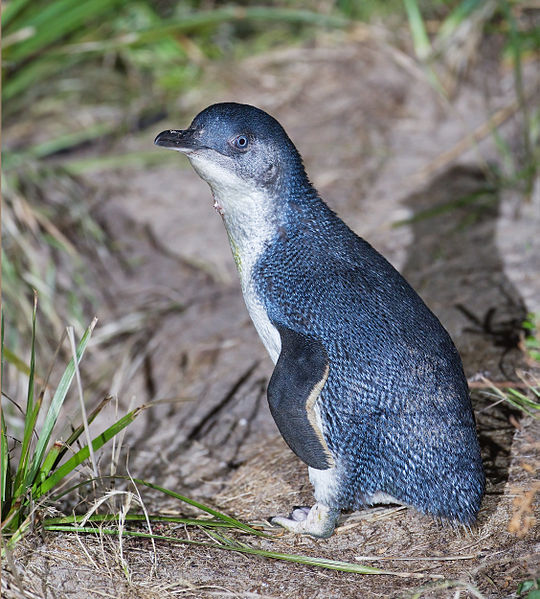
Many saw March of the Penguins as a pro-design film, because of the astonishing social organization of Antarctic penguins, to survive under seemingly impossible conditions. It’s not clear by what process it could have been accidentally arrived at.*
Now we learn about surprising adaptation of ”little“ (or fairy) penguin chicks, from Genelle Weule (ABC News, August 29, 2011): How they survive being left on their own when “Penguin parents take off for feed”:
The joint Australian and French study led by PhD candidate Claire Saraux from the University of Strasbourg challenges previously held beliefs that inshore birds, which forage short distances from land, only take long trips away from the nest when conditions are bad.
The research found that after the first couple of weeks of chick-raising, little penguins (Eudyptula minor) alternate between two consecutive long trips, followed by several short daily trips.
In fact, researchers learned from penguin tagging that they do it regardless of food supply. And, Weule reports, they are the only inland bird to follow this shore bird strategy. The parents take short trips to get food for chicks and long trips (up to 14 days) to gain weight.
“During short trips [penguin parents] are not feeding for themselves, if they are they’re little because they have this amazing thing where they can change the pH of their stomach to slow down digestion,” explains Chiaradia.
Neat.
“So then they bring this food in and give to the chicks, but over time they start to lose body condition because they’re not eating properly so at some stage they say ‘okay, that’s enough, I have to look after myself before I actually die’.”
The penguin probably isn’t thinking that, but something is doing its thinking for it.
“So then they go for long trips … and feed for themselves. When they come back … they bring food for the chicks but much, much less than they would do in a day trip because they are actually digesting that food for themselves.”
The interesting thing is that they come back at all, given that they were starving. Starving animal parents often just abandon their brood, or eat them. But this is an annual cycle, so probably a trigger rather than a source of stress for the bird. The conundrum is how it got to be such a cycle.
Vid:
*In response, Darwinian biologist Steve Jones pretended to see competition between males, when everything depended critically on co-operation. And the French filmmakers announced that the film was not pro-ID because the penguins are not monogamous [?]. = They can’t know whether their separated mates survived, so they just change mates each year.
Follow UD News at Twitter!